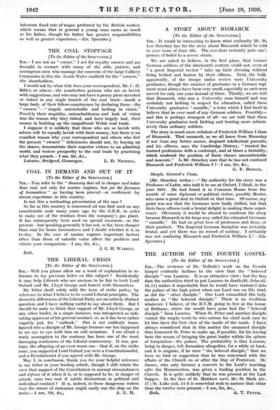A STORY ABOUT BISMARCK
[To the Editor of .the SPECTATOR.] SIR,—It would be interesting to know what authority Mr. St. Loe Strachey has for the story about Bismarck which he told in your issue of June 5th. The anecdote certainly puts one's powers of belief to a severe strain.
We are asked to believe, in the first place, that trained German soldiers of the nineteenth century could not, even at " a great Imperial review " take up their dressing without being kicked and beaten by their officers. Next, the bulk, apparently, of the troops under review were University graduates, though the number of graduates in a German regi• meat must always have been very small, especially as such men served for only one year instead of three. Thirdly, we are told that Bismarck, who was a University man himself and was certainly not lacking in respect for education, called these University graduates " canaille," a term which I find hard to believe that he ever used of any German soldiers. Fourthly— and this is perhaps strangest of all—we are told that these University graduates took kicking and beating more submis. sively than ordinary soldiers.
The story is much more redolent of Frederick William I than of Bismarck. That monarch, as we all know from Macaulay if not from any better source, despised intellectual pursuits; and his officers, says the Cambridge History, " treated the learned professions with a contempt, and at times a brutality,' which rendered the position of those classes uncomfortable and insecure." Is Mr. Strachey sure that he has not confused Bismarck and Frederick William I ?—I am, Sir, &c., G. F. BRIDGE.
Steeple, Gerrard's Cross.
[Mr. Strachey writes :—" My authority for the story was a Professor of Latin, who told it to me at Oxford, I think, in the year 1881. He had heard it in Common Room from the mouth of some diplomat or political visitor, possibly Morier, who came a great deal to Oxford at that time. Of course, my point was not that the Germans were badly drilled, but that their fussy officers took a brutal delight in making them super- exact. Obviously it would be absurd to condemn the story because Bismarck in his large way called the educated Germans " canaille." He had no great love of professors and dons, or their product. The Imperial German discipline was certainly brutal, and yet there was no record of mutiny. I certainly was not confusing Bismarck and Frederick William I."—ED. Spectator.]










































 Previous page
Previous page